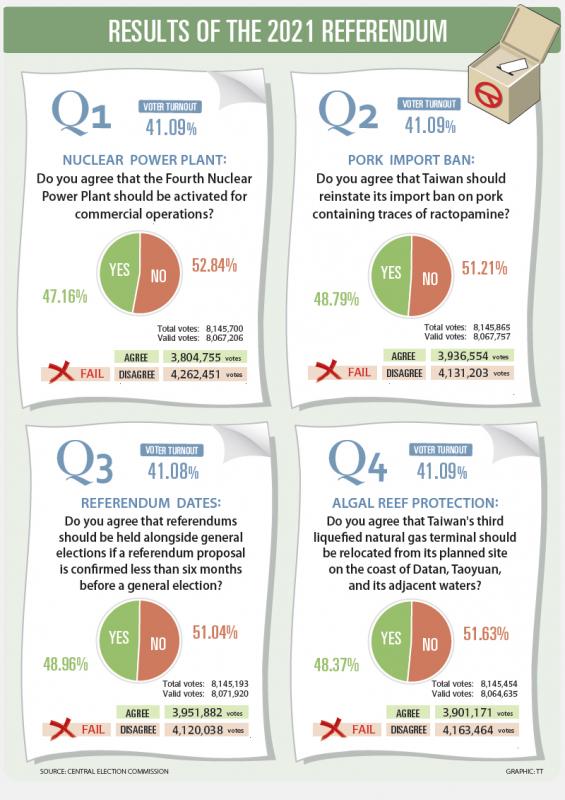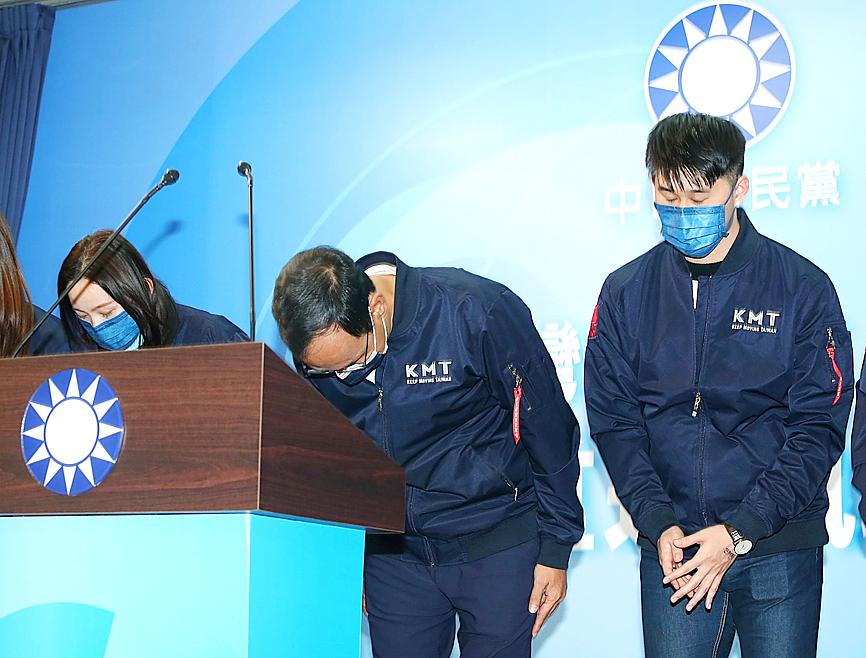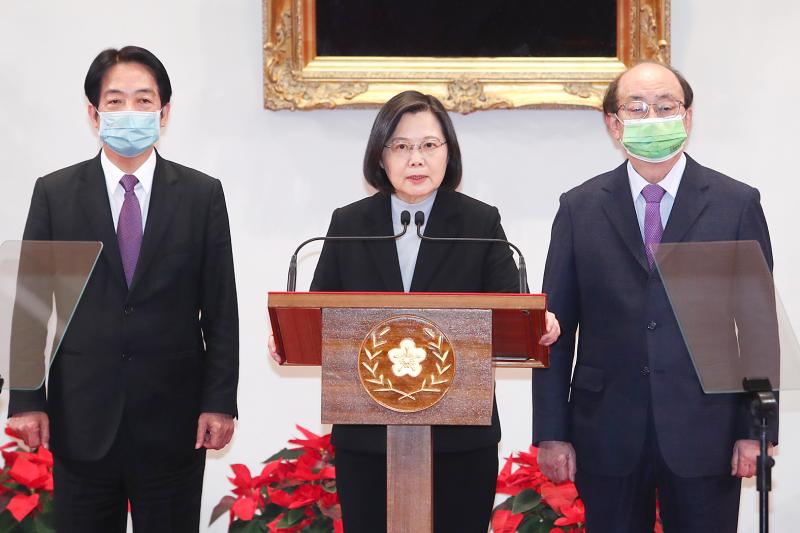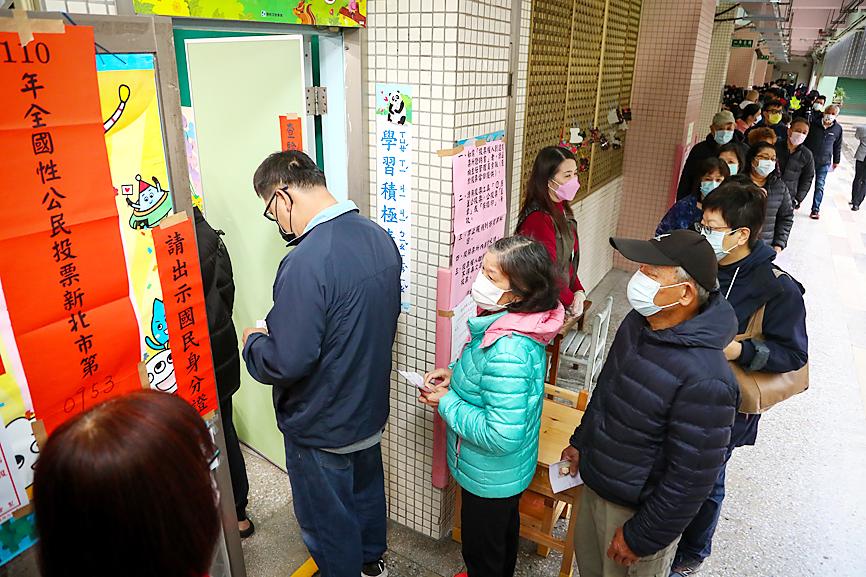Four initiatives challenging the government’s policies on energy, food safety, environmental protection and regulations governing referendums failed to pass yesterday in a national referendum characterized by a relatively low turnout and nearly identical vote margins on all four issues.
Under the Referendum Act (公民投票法), a referendum can only pass if an initiative is supported by at least one-quarter of all eligible voters, and the “yes” votes exceed the “no” votes. For yesterday’s vote, that meant an initiative could only pass if it garnered at least 4,956,367 “yes” votes and there were fewer “no” votes.
Referendum No. 17, proposed by nuclear power advocate Huang Shih-hsiu (黃士修), asked voters: “Do you agree that the Fourth Nuclear Power Plant should be activated for commercial operations?”

The question garnered 4,262,451 votes against and 3,804,755 in favor, with a voter turnout rate of 41.09 percent.
Referendum No. 18 asked voters: "Do you agree to a total ban on the importation of pork and related products containing the beta agonist ractopamine?" It garnered 4,131,203 “no” votes and 3,936,554 “yes” votes, with a voter turnout rate of 41.09 percent.
Spearheaded by Chinese Nationalist Party (KMT) Legislator Lin Wei-chou (林為洲), the initiative was prompted by the government’s move to lift a ban on the importation of pork containing traces of ractopamine, even though Taiwanese hog farmers are banned from using the feed additive.

Photo: CNA
The lifting of the ban, which took effect on Jan. 1, was widely viewed as an effort to satisfy US prerequisites for any negotiations on a bilateral trade deal.
Asked about the vote, an official at the American Institute in Taiwan yesterday said: “We will continue to seek constructive engagement with Taiwan on issues that affect exports of US food and agricultural products.”
Referendum No. 19 asked: “Do you agree that referendums should be held alongside general elections if a referendum proposal is confirmed less than six months before a general election?”

Photo: CNA
The question received 4,120,038 “no” votes and 3,951,882 “yes” votes, with a voter turnout rate of 41.08 percent.
It was initiated by former KMT chairman Johnny Chiang (江啟臣).
Referendum No. 20, initiated by Rescue Datan’s Algal Reefs Alliance convener Pan Chong-cheng (潘忠政), asked: “Do you agree that Taiwan’s third liquefied natural gas [LNG] terminal should be relocated from its planned site on the coast of Datan, Taoyuan, and its adjacent waters?”

Photo: CNA
The question garnered 4,163,464 votes against and 3,901,171 in favor. It had a voter turnout rate of 41.09 percent.
The Democratic Progressive Party (DPP) had urged people to vote against all four questions, while the main opposition KMT supported a “yes” vote for all of them.
In response to the referendum results, President Tsai Ing-wen (蔡英文), who is the DPP chairperson, last night said there were no winners or losers in the referendums and that the issues were questions about the nation’s direction.
The results show Taiwanese support opening up to the world, the nation’s energy transition, a balanced approach to environmental protection and economic development, and rational discourse on public policy, she told a news conference at the Presidential Office.
The initiatives were also expressions of dissent against the government’s agenda, which is normal in a democratic society, she said, adding that policymaking should accommodate for differences in opinion.
Democracy continues to be the strongest form of defense for Taiwan as the government looks to the challenges ahead, she said before thanking the public for casting ballots in the referendums.
Separately, KMT Chairman Eric Chu (朱立倫) expressed the party’s apologies over the outcome of the referendums.
The result is a victory for a new autocratic government in Taiwan that pretends to be a democracy, but is a defeat for civic groups and people who wish to deepen democracy in the nation, Chu told a news conference at KMT headquarters in Taipei.
The turnout reflected the support base on both sides, Chu said, adding that he had not tried hard enough to sway independent voters.
He would take responsibility as party chairman for failing to achieve the party’s goals, he said.
In response to some party members’ demands that the party discipline New Taipei City Mayor Hou You-yi (侯友宜) of the KMT for refusing to reveal his stance on the four initiatives, Chu said he shouldered the majority of the blame.
“The party must find more friends and not enemies,” he said.
The KMT would continue to push to improve democracy in Taiwan, he added.
Meanwhile, the Taiwan People’s Party (TPP) in a statement blamed disinformation and trickery for the result.
Tsai mispresented the initiative on pork imports as a total rejection of US pork, while the relocation of the LNG terminal was distorted into a proposal to halt its construction, the TPP said.
The rejection of the initiatives is a negative turn in the nation’s democratization that indicates “the emergence of a giant green new authoritarian machine,” the party said, referring to the pan-green camp.
That none of the initiatives reached the legal threshold shows that people have punished political parties for sowing division and that the public was unresponsive to fear-mongering, it said.
The results should cause consternation in every political party in the nation, it added.
Inconvenient election mechanisms were another reason for the low turnout and lawmakers should create a law to allow absentee voting, it said.
Additional reporting by Chen Yun, CNA and Reuters

ACTION PLAN: Taiwan would expand procurement from the US and encourage more companies to invest in the US to deepen bilateral cooperation, Lai said The government would not impose reciprocal tariffs in retaliation against US levies, President William Lai (賴清德) said yesterday, as he announced five strategies to address the issue, including pledging to increase Taiwanese companies’ investments in the US. Lai has in the past few days met with administrative and national security officials, as well as representatives from various industries, to explore countermeasures after US President Donald Trump on Wednesday last week announced a 32 percent duty on Taiwanese imports. In a video released yesterday evening, Lai said that Taiwan would not retaliate against the US with higher tariffs and Taiwanese companies’ commitments to

Intelligence agents have recorded 510,000 instances of “controversial information” being spread online by the Chinese Communist Party (CCP) so far this year, the National Security Bureau (NSB) said in a report yesterday, as it warned of artificial intelligence (AI) being employed to generate destabilizing misinformation. The bureau submitted a written report to the Legislative Yuan in preparation for National Security Bureau Director-General Tsai Ming-yen’s (蔡明彥) appearance before the Foreign Affairs and National Defense Committee today. The CCP has been using cognitive warfare to divide Taiwanese society by commenting on controversial issues such as Taiwan Semiconductor Manufacturing Co’s (TSMC, 台積電) investments in the

HELPING HAND: The steering committee of the National Stabilization Fund is expected to hold a meeting to discuss how and when to utilize the fund to help buffer the sell-off The TAIEX plunged 2,065.87 points, or 9.7 percent, to close at 19,232.35 yesterday, the highest single-day percentage loss on record, as investors braced for US President Donald Trump’s tariffs after an extended holiday weekend. Amid the pessimistic atmosphere, 945 listed companies led by large-cap stocks — including Taiwan Semiconductor Manufacturing Co (TSMC, 台積電), Hon Hai Precision Industry Co (鴻海精密) and Largan Precision Co (大立光) — fell by the daily maximum of 10 percent at the close, Taiwan Stock Exchange data showed. The number of listed companies ending limit-down set a new record, the exchange said. The TAIEX plunged by daily maxiumu in just

‘COMPREHENSIVE PLAN’: Lin Chia-lung said that the government was ready to talk about a variety of issues, including investment in and purchases from the US The National Stabilization Fund (NSF) yesterday announced that it would step in to staunch stock market losses for the ninth time in the nation’s history. An NSF board meeting, originally scheduled for Monday next week, was moved to yesterday after stocks plummeted in the wake of US President Donald Trump’s announcement of 32 percent tariffs on Taiwan on Wednesday last week. Board members voted to support the stock market with the NT$500 billion (US$15.15 billion) fund, with injections of funds to begin as soon as today. The NSF in 2000 injected NT$120 billion to stabilize stocks, the most ever. The lowest amount it